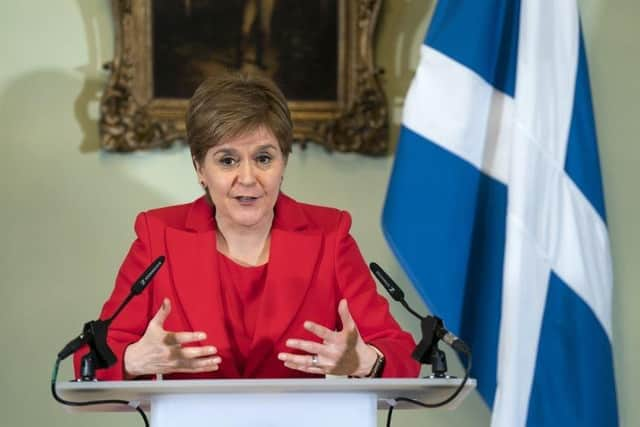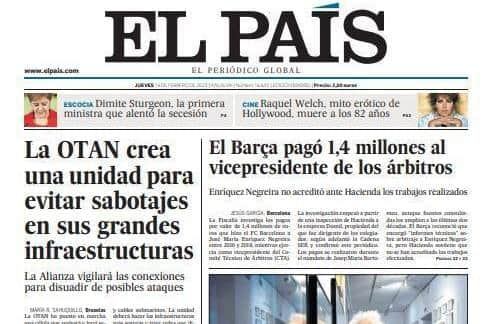Nicola Sturgeon resigns: How world media reacted and reported on Nicola Sturgeon's resignation and the impact on Scottish independence
This article contains affiliate links. We may earn a small commission on items purchased through this article, but that does not affect our editorial judgement.
Sturgeon announced she will stand down after eight years as First Minister, telling a press conference “the time is now” – adding “in my head and in my heart I know that time is now. That it’s right for me, for my party and my country.”
She told reporters: “Can I give this job everything it demands and deserves for another year, let alone for the remainder of this parliamentary term, give it every ounce of energy that it needs in the way that I have strived to do every day for the last eight years? The answer honestly is different.”
Advertisement
Hide AdAdvertisement
Hide AdThe decision created headlines in Scotland and across the world in a seismic day for UK and world politics.


Here’s a look at how the world reported and reacted to the news that Nicola Sturgeon would be stepping down after eight years in charge.
CNN reported on the news saying that a host of factors were contributing to the resignation, but that “independence movement has stalled, with no real chance of a referendum on the cards any time soon.” They wrote: “Wednesday’s shock announcement led to breathless speculation over Sturgeon’s timing, particularly as she had only recently pledged to make the next British general election a de-facto second referendum on Scottish independence.
“While Sturgeon underlined that she felt she didn’t have enough left in the tank to perform her duties, her list of political headaches has grown. The SNP’s polling has dipped, making a dent in its grip on Scottish politics. The independence movement has stalled, with no real chance of a referendum on the cards any time soon.
France24 ran a televised piece simply asking “What is the future of the SNP?” with John Curtice speaking to François Picard with another article outlining the number of issues that led to the resignation of the First Minister: “In recent months, Sturgeon became embroiled in a row over transgender policies after Scotland passed a bill to make it easier for people to change their legal gender.”


The Irish Times focused on what the resignation meant for the future of the UK writing: “The resignation may also reshape the UK political landscape. Labour’s hopes that it can re-establish its Scottish predominance, vital to taking back power at Westminster, will have been given a boost.
“As one of the party’s senior figures said yesterday in a backhanded compliment, “It’s good for us. The biggest impediment to us turning it around in Scotland was Nicola Sturgeon”.
The Irish Times also questioned what the future held for the SNP in their editorial and the similarities in her speech to that of Jacinda Ardern: “Her steady, moderate but robust leadership has significantly broadened her party’s appeal and standing, and her departure will inevitably raise questions about the viability of her party’s independence project.”
Advertisement
Hide AdAdvertisement
Hide Ad“Sturgeon couched her announcement in language echoing that of New Zealand’s former prime minister Jacinda Ardern in her own recent unexpected resignation.”
Spanish newspaper El Pais ran with Nicola Sturgeon’s resignation on the front page of their print edition with a caption reading: "Sturgeon, the prime minister who encouraged secessionism, resigns” with their coverage suggesting that “the independence movement is declining in Scotland.”
Le Monde wrote that the resignation was a real “bombshell moment” for Scottish and UK politics and touched on the human level that Nicola Sturgeon had emphasised in her speech.
The French paper also noted that support for independence had stalled but despite “a very turbulent past few weeks, Sturgeon has remained the undisputed leader of politics and the most popular ahead of all her rivals and opponents. And her party is well ahead in the polls.”
German newspaper Die Ziet published a powerful analysis piece titled “Her goal was almost impossible to reach” following the resignation of Nicola Sturgeon touching on the “brutal” nature of modern day politics and the impact it has at a personal level .
They touched on the impact of Brexit but ultimately how Nicola Sturgeon failed to truly sell independence to the majority of Scots, writing: “Sturgeon would have preferred to lead Scotland to independence and – after Brexit – even back into the EU. But she never explained how a de facto hard EU border in the middle of the UK should have worked, which currency, which central bank, which tax and pension policy, which defence policy would have shaped the new Scotland.”
El Nacional, a Catalonian newspaper called Nicola Sturgeon “the face of Scottish independence” and also ran with pictures of unionists celebrating and “doing a conga” in George Square in Glasgow. The paper also ran a profile piece on Kate Forbes titled “ This is the 33-year-old politician that can take over from Nicola Sturgeon”
The New York Times wrote that the resignation of Nicola Sturgeon “removes one of the most formidable figures from British politics. A skilled veteran of the United Kingdom’s system of power sharing and a sure-handed leader during the coronavirus pandemic, she outlasted four British prime ministers, while bedevilling each of them with her unyielding push for Scottish independence.
Advertisement
Hide AdAdvertisement
Hide Ad“But that goal has remained elusive and appears no closer than it was nearly a decade ago, when voters rejected a proposal for independence. Support for leaving the union has ebbed and flowed over the years, but the British government remains implacably opposed to another referendum. And Ms. Sturgeon said she was no longer the leader to see the battle through”
Comments
Want to join the conversation? Please or to comment on this article.